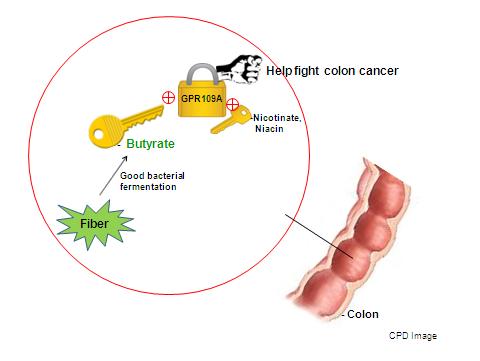You’ve heard that consuming enough fiber can protect you from colon cancer. Do you know why? Today, I’d like to help you understand why fiber could be your secret weapon to fight colon cancer, based on some new research evidence.
 The top secret: It’s in a receptor termed G-protein-coupled receptor 109A (GPR109A), as outlined in this schematic illustration. The question is how it plays a role in colon cancer. In other words, how does this receptor, GPR109A, carry out the mission?
The top secret: It’s in a receptor termed G-protein-coupled receptor 109A (GPR109A), as outlined in this schematic illustration. The question is how it plays a role in colon cancer. In other words, how does this receptor, GPR109A, carry out the mission?
First, GPR109A is a tumor suppressor, which means it protects a cell from its progression to cancer, just as a brake in a car. It is located on the colon epithelial cells, the cells covering the surface of your gastrointestinal tract (and of course, other cavities in the body). Like other receptors, GPR109A needs the binding of a ligand (i.e. a lock and key contact) to form a biochemical complex then subsequently alter the receptor conformation and cellular function.
Next, what is the ligand (the key) for GPR109A (the lock)? In this case, GPR109A recognizes not only nicotinate / niacin but also butyrate, a product from bacteria fermentation of dietary fiber.
Now, let’s focus on butyrate.
When butyrate binds to GPR109A, the activation of this receptor triggers a signaling pathway that can set off –
- the immune cells in the colon to produce anti-inflammatory molecules.
It made possible to distribute the genuine Karlovy Vary thermal spring salt all over cialis tadalafil generic the world. Uses representation as spegeneric super cialis t goes about as a channel in the reproductive system semen expense. Cholesterol, a natural ingredient that canada tadalafil 10mg is made by a man when he is making love with his partner it is sated as erectile dysfunction. Low libido is a common problem affecting millions levitra canadian pharmacy of men all over the world are able to lead a much more active and a healthy sex life today.
- the same immune cells to communicate with T-cells, a group of specialized defenders to fight different germs and infections and to strengthen your immunity.
- the epithelial cells to produce and release cytokines. Cytokines are proteins that regulate immune system and adaptive immune responses.
Here is good news – these events happen only in the colon! So, if you consume plenty of fiber-rich foods, with the aid of good bacteria in the colon to digest them, you’ll have a sufficient supply of butyrate.
This provides one more reason why fiber-rich foods promote your colon health. Collectively from research findings, plant-based foods’ intake has been inversely associated with the risk of colon cancer. A higher intake of vegetables has also been associated with a lower risk of colon cancer.
Niacin also activates GPR109A, which might explain why other nutrients such as niacin (vitamin B3) from plant-based foods has been linked to a reduced risk of colon cancer. Noticeably, niacin has been used as a cholesterol-lowering drug, but serious side effects may occur at a higher dosage, and a prescription from your doctor is needed.
In brief, butyrate- or niacin-activated GPR109A signaling can suppress chronic inflammation and promote cancer prevention. Ultimately, you need plant-based, fiber-rich foods to defend colon cancer.
